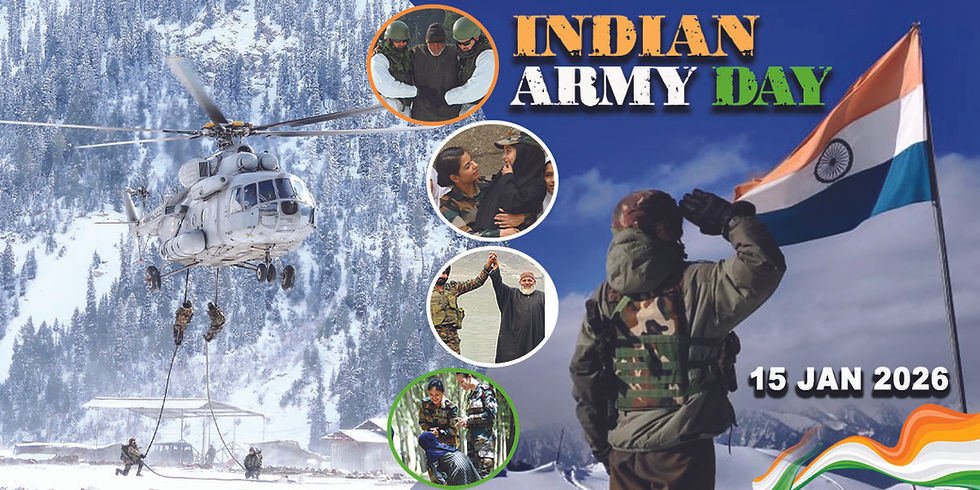BONHOMIE IN VALLEY
- Soldier Stories Of Kashmir

- Oct 8, 2022
- 4 min read
"Every citizen should be a soldier. This was the case with the Greeks and Romans and must be that of every free state."
-Thomas Jefferson
Indian Military history dates back to the Indus Valley civilisation. Anecdotes of battles between opposing kingdoms are woven throughout the history of the Vedas. As a result, the Indian population has a long heritage of serving in the military, resulting in a synergistic relationship between civilians and the Army. This long history of a solid soldier-civilian bond has led to the current situation, in which Army has rendered exemplary service to the populace on numerous occasions. Incidents in civil society would impact the soldier because of the nation's fundamental social structure, which wedded soldiers to the organization and its upheavals. Indian Army has been responsible for maintaining the country's territorial integrity from internal and external threats while operating in varied geographical and operational conditions, from the high elevations of Siachen and Leh to the deserts of Rajasthan. One of the reasons for the long-lasting bond between the Indian Army and citizen is the success of the Indian Army in battling terrorism and insurgency, which is recognised and respected globally. Indian Army's doctrine of winning the Hearts and Minds of the people and its philosophy of "Iron fist with a velvet glove" is being revered by governments worldwide.
Such initiatives are determined and chosen in collaboration with the state government and the general populace. In the UT of Jammu & Kashmir, which has experienced three decades of violence and political unrest, this humanitarian face of the Indian Army is working miracles. The image of the Indian Army has drastically changed from that of a sombre gun-toting soldier behind terrorists to that of a "Local Hamdard" handing out candy to youngsters, medicines to the elderly, and a helping hand to young people. In remote border regions, it is encouraging to witness Army soldiers conducting practice tests for Agnipath aspirants or carrying a heavily pregnant woman on their shoulders to the nearest hospital or helipad in the midst of snow and bad weather. To build relationships with the local population, Army is hosting iftar parties, conducting sports meets, Education fests, Tourism Mela and various other cultural programmes which has attracted not only tourists but also multinational investors to the valley.
I was back in the Kashmir valley after 10 years. Previously I served in Shopian. I couldn't help but notice how the situation has changed drastically in the valley. Indian Army has been carrying out new initiatives to further strengthen the soldier citizen connect and encourage the talent of Kashmir and provide new opportunities to them. Indian Army in Kashmir have been providing assistance to the local population in all difficult times and have always worked for the development in Kashmir. The assistance provided to residents amid floods and the provision of necessities during the COVID Pandemic hould not be overlooked. One must not forget the disastrous earthquake and floods of 2005 and 2014, which destroyed the state infrastructure and shut the state apparatus leaving the populace at the mercy of the almighty. Indian Army was the one that stepped up to the plate and swiftly deployed in numerous flood-affected areas to carry out relief operations. The Indian Army started a campaign to reach out to people in remote and rural areas of Kashmir to educate and help them in times of need in the year 2020 during the COVID pandemic and statewide lock down. The Army's "Khairiyat Patrols" were frequently handing out leaflets, masks, hand sanitiser and meals to those in need in outlying locations. Another example of the strong Citizen Soldier connect is the support the Army receives from locals in the form of porters in the border areas. Who can forget the Pakistani tribal invasion in 1947 or 1965 when Kashmiris worked with the Indian Army shoulder to shoulder to throw out the invaders.

The Kashmiris generously transported supplies to the Indian Army soldiers who were battling on the border and drove the Pakistani invaders back during the 1999 Kargil conflict. Local porters produced a life support system for the troops stationed in remote locations along the control line. The local porter will always be willing to provide supplies to our men when they need them the most, regardless of how remote the post is. The military's penchant for influencing people's opinions has yielded great rewards in the form of a discernible shift in the local Kashmiri viewpoint. Some of the benefits of these efforts include a hostile atmosphere where terrorism cannot thrive and growing support for the "protectors of the realm." Citizens and soldiers now function as the same. A citizen today is looking forward to serve in the military tomorrow. Through their civic engagement and immediate impact projects, soldiers operating in remote locations resemble some form of governance. Whether in the case of a war or other hostilities, the Army will continue to rely on the residents of border regions and one can undoubtedly say that the local residents are the real heroes of Kashmir.
I am sure that the bond between soldiers and citizens has endured the test of time and will continue to become more deeply ingrained in the years to come. This relationship between citizens and Soldiers has been built gradually over a strong foundation of mutual love, respect, and brotherhood and will continue to grow further.







really now we Kashmiri's feel that army is with us, they are our well wishers, Allah sabko salamat rakhe
Nice article and shows the new face of kashmir